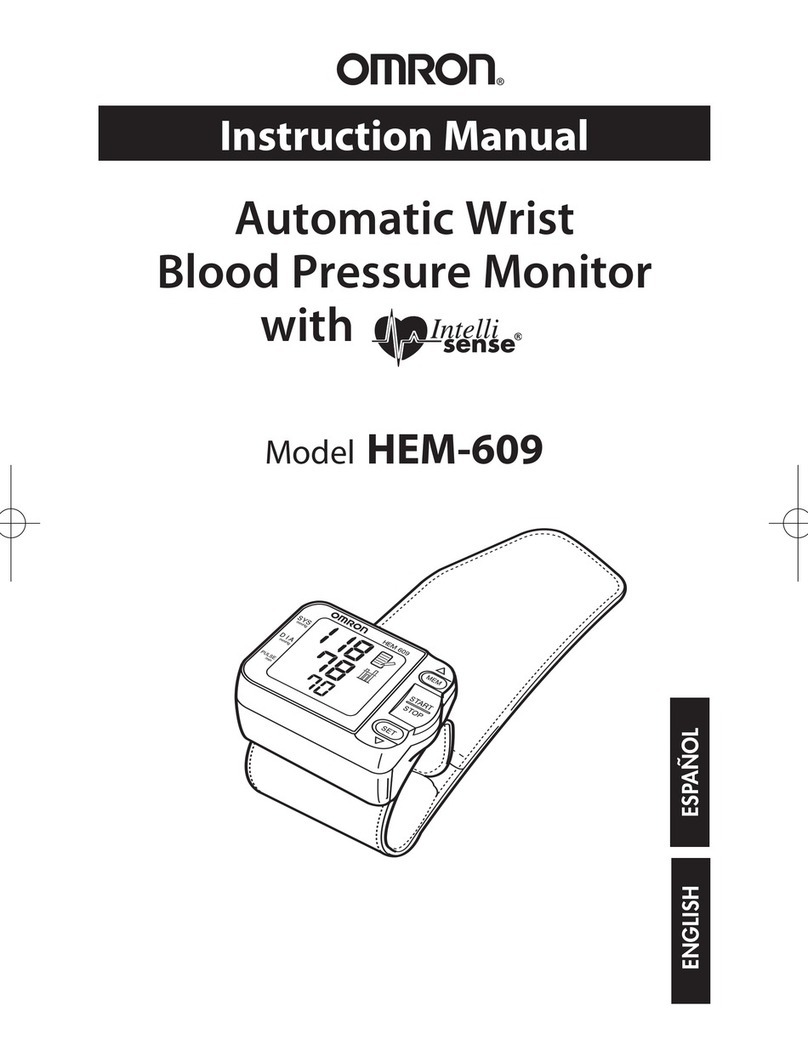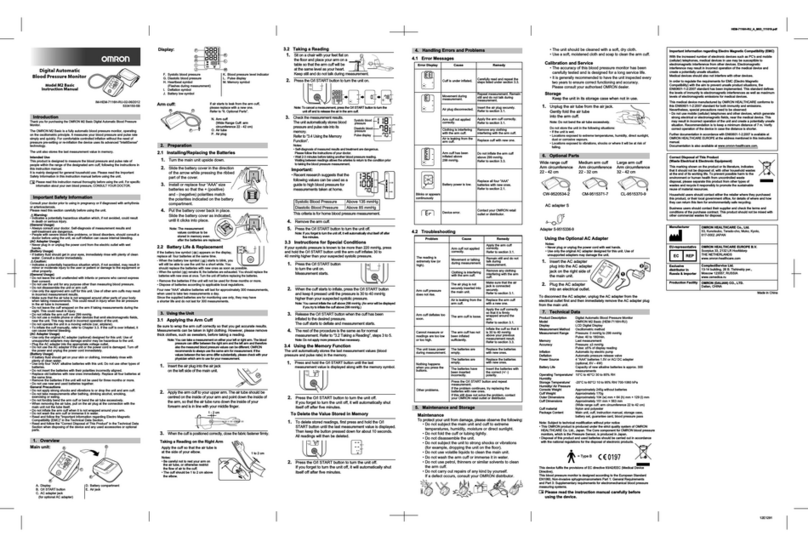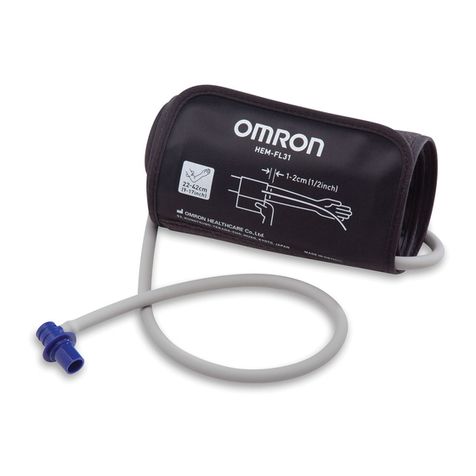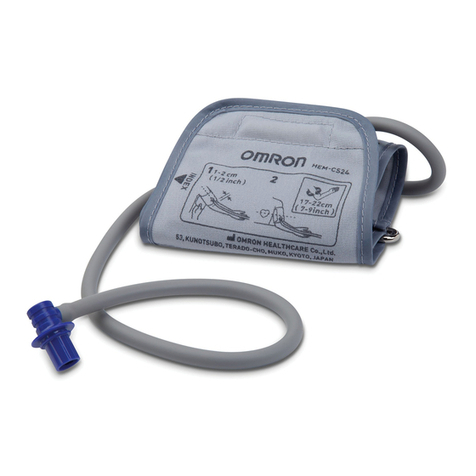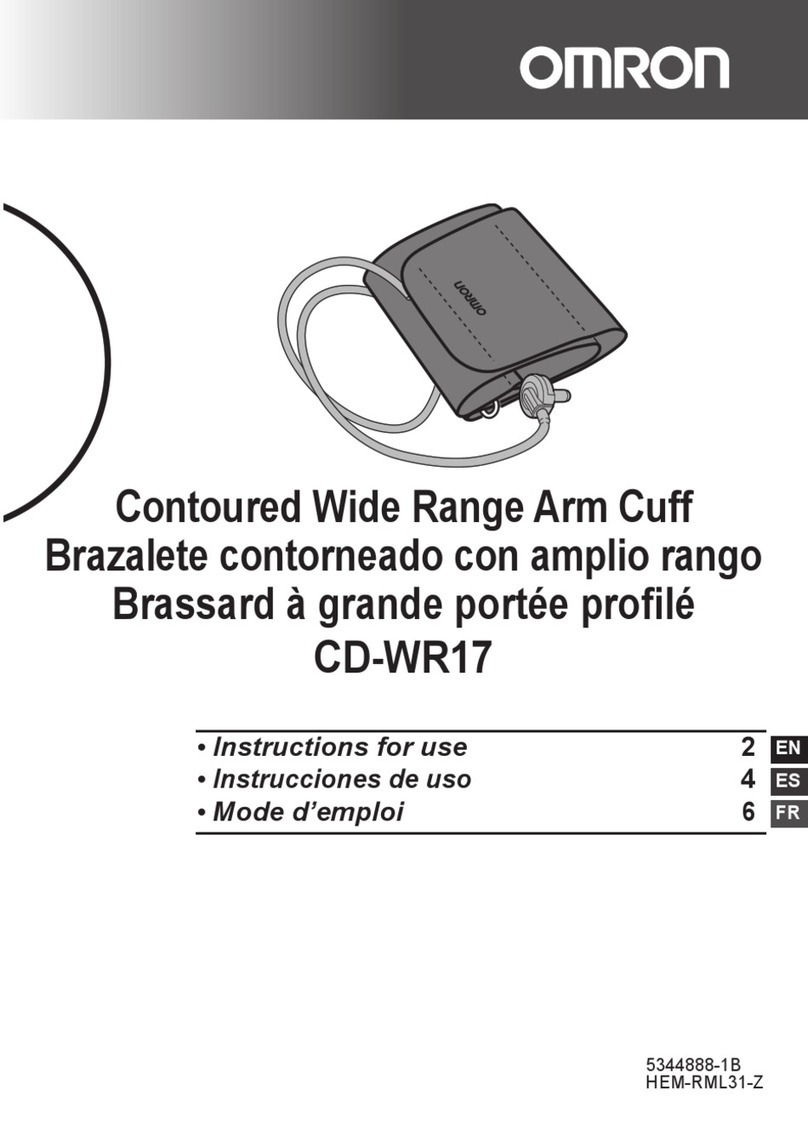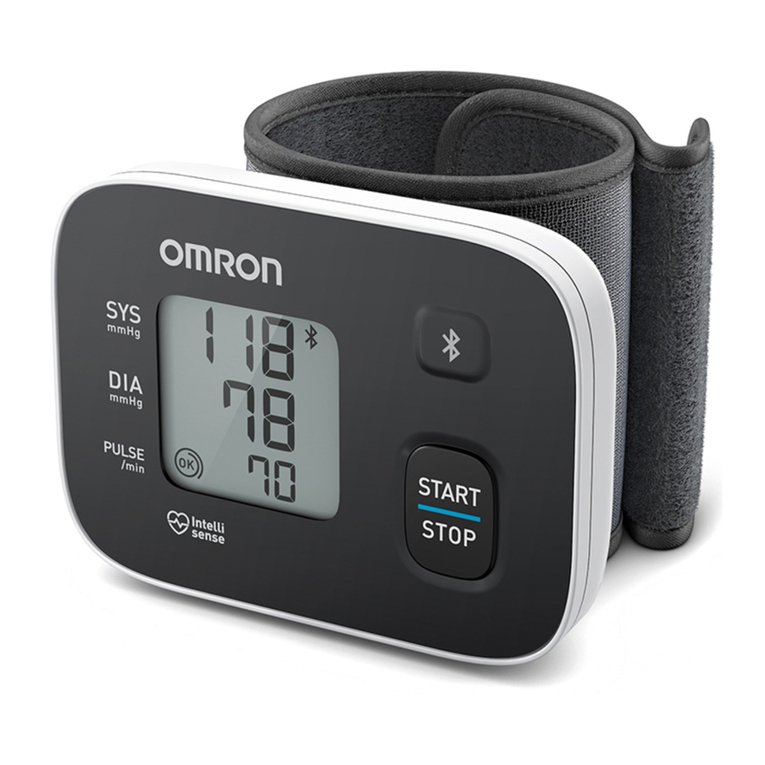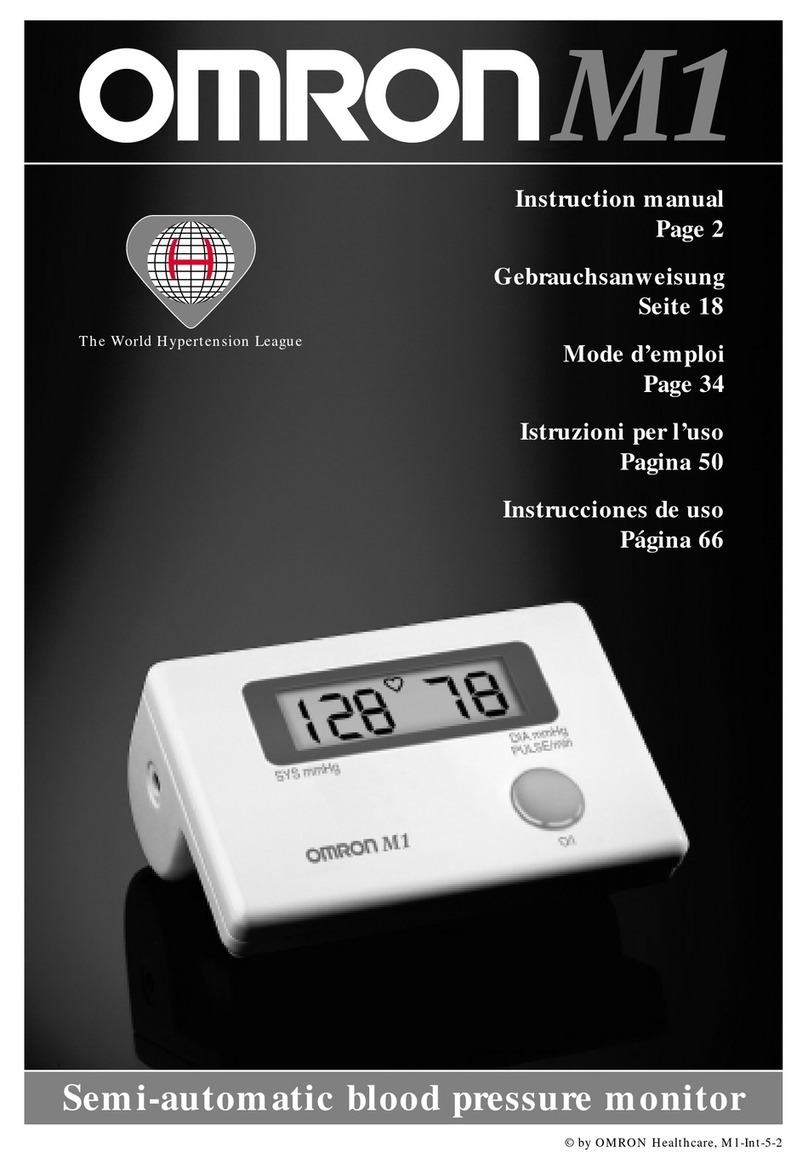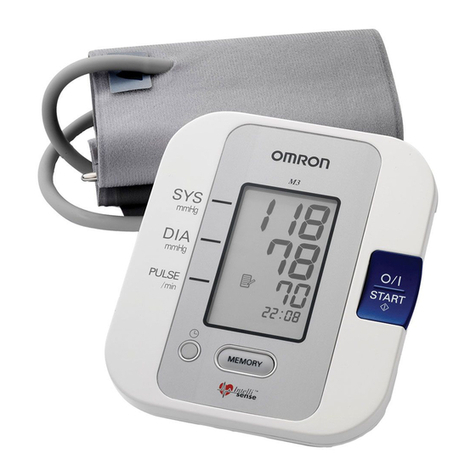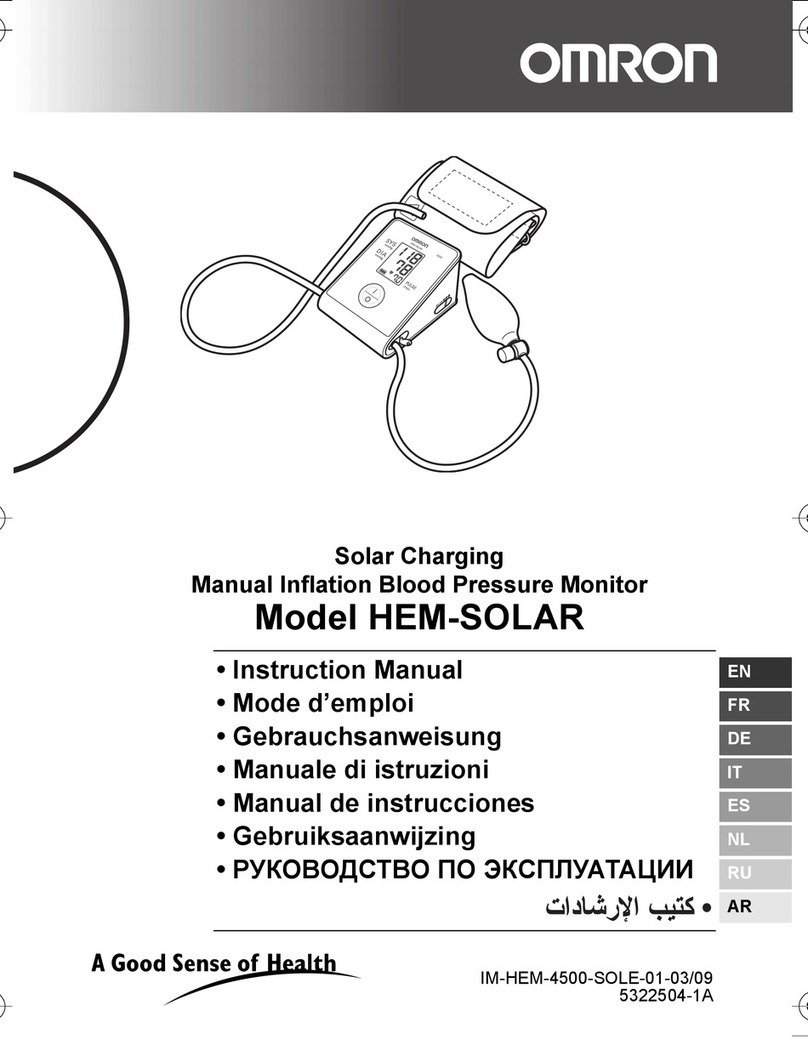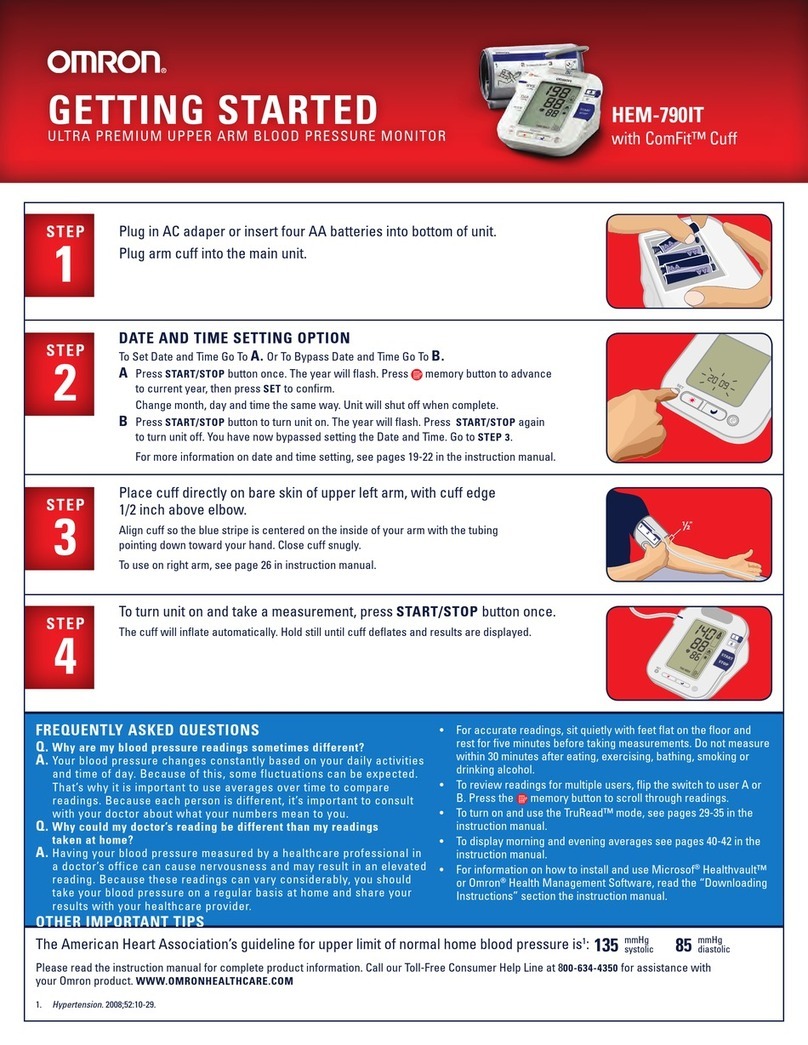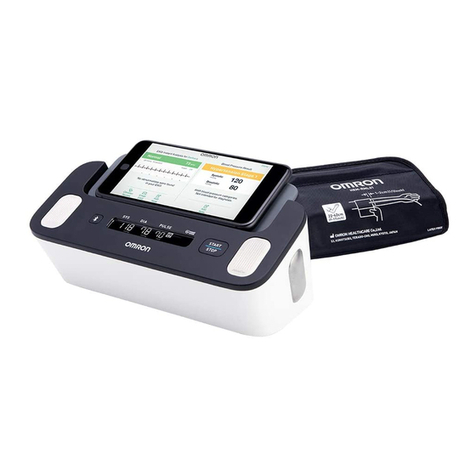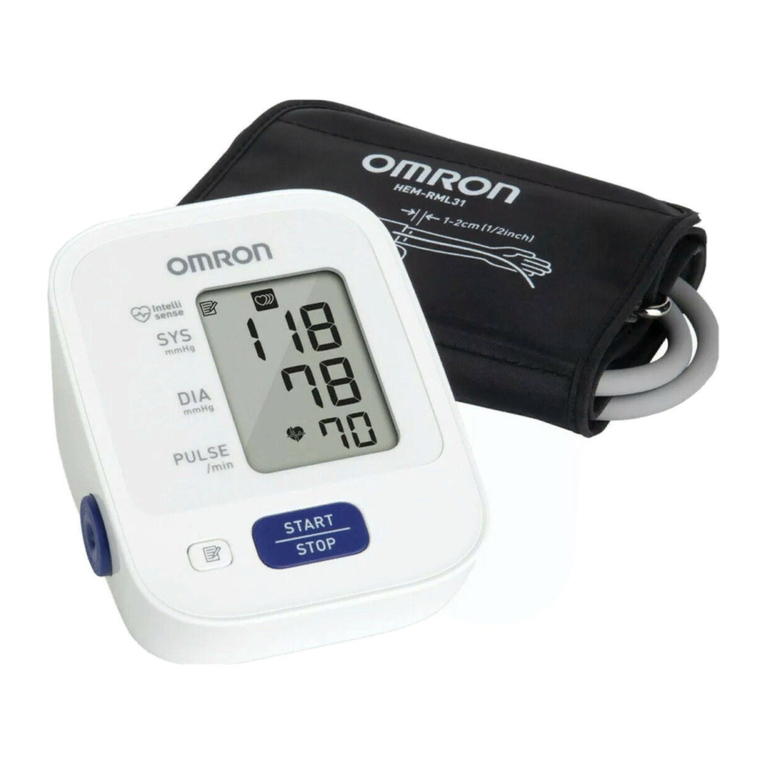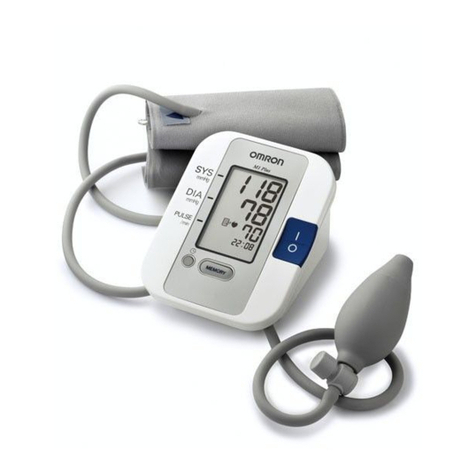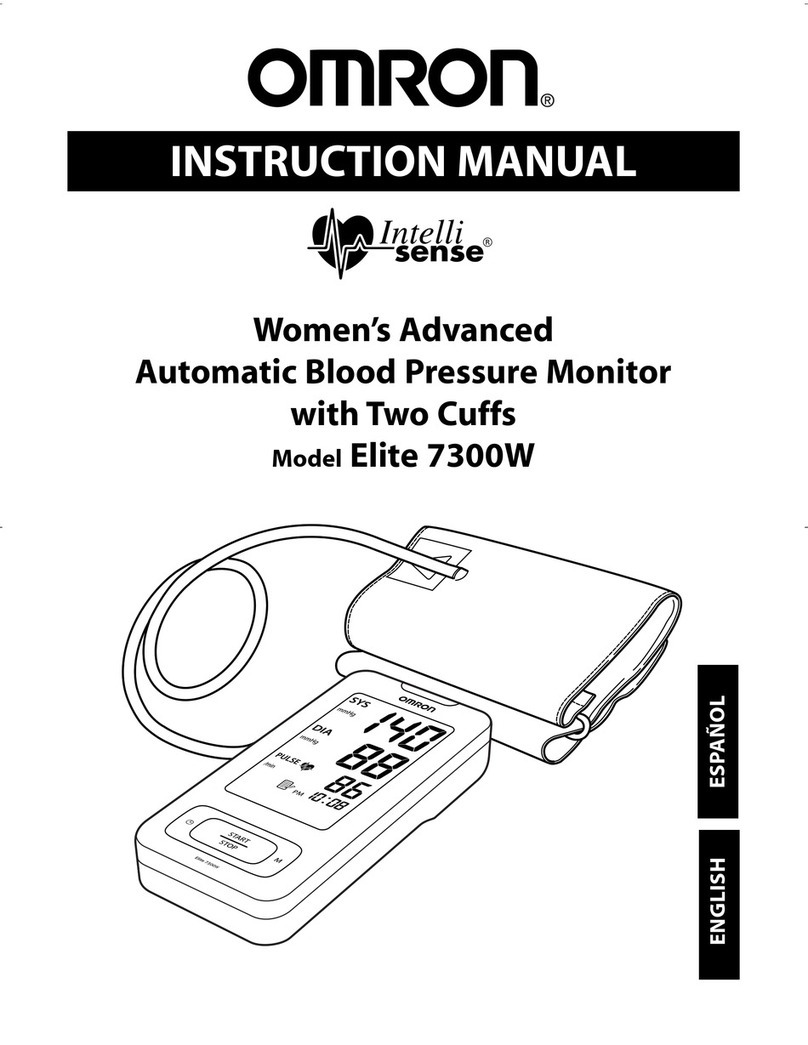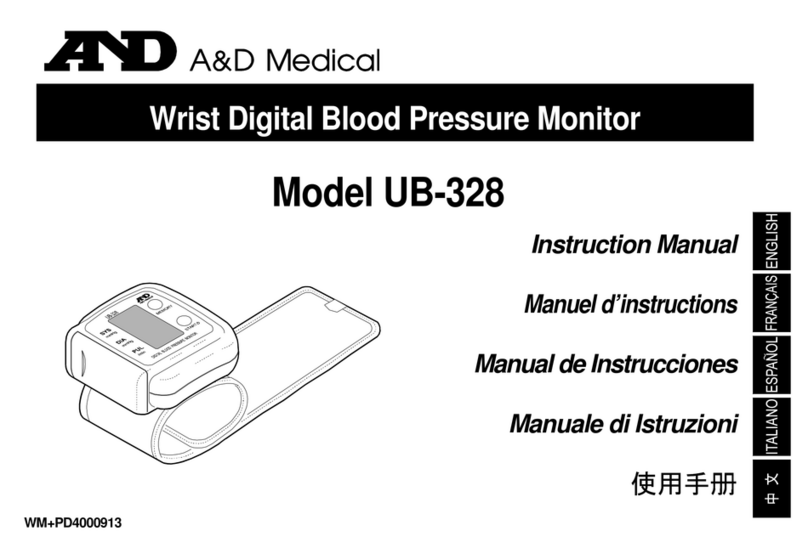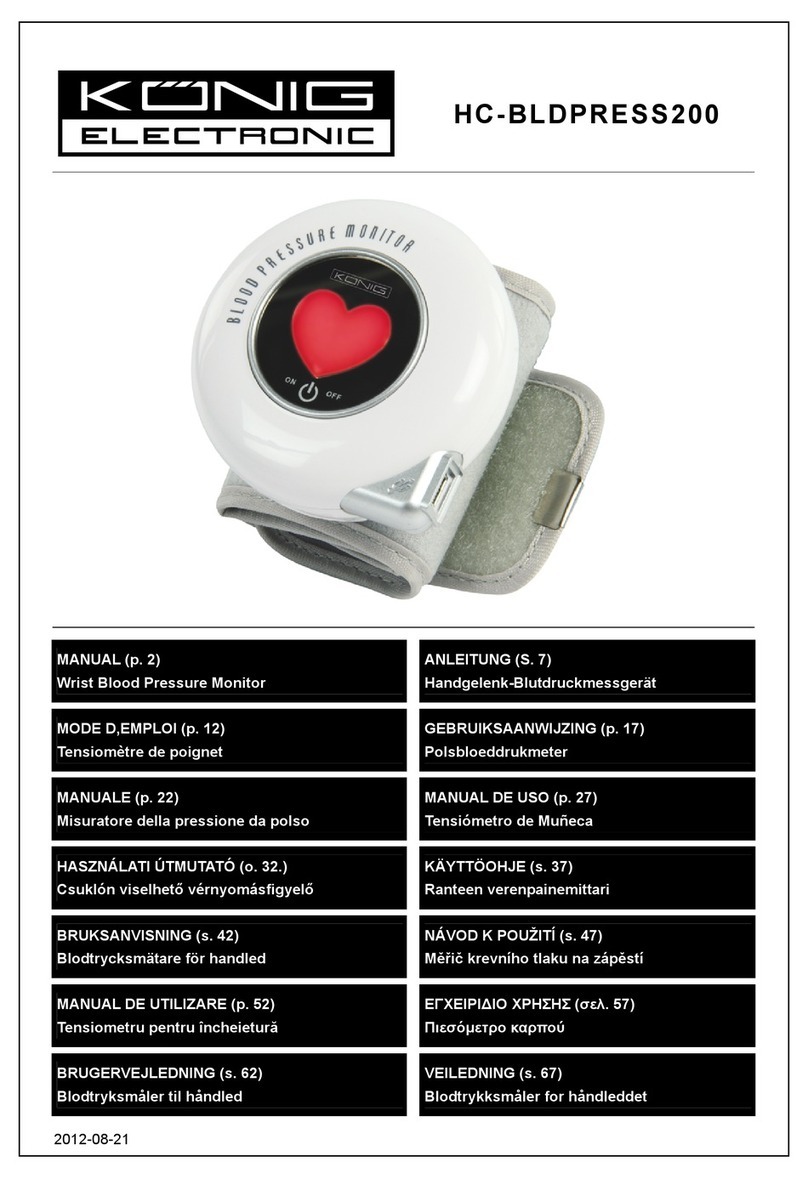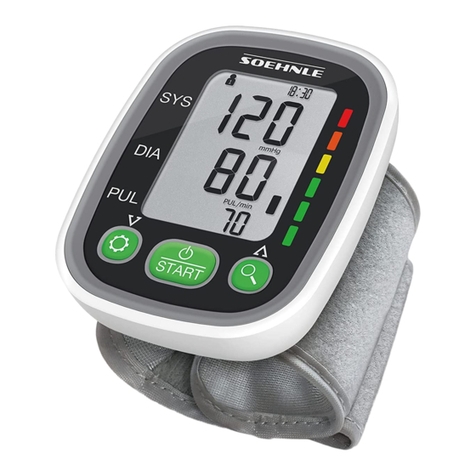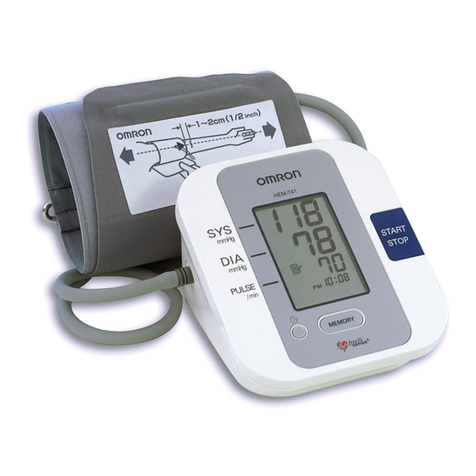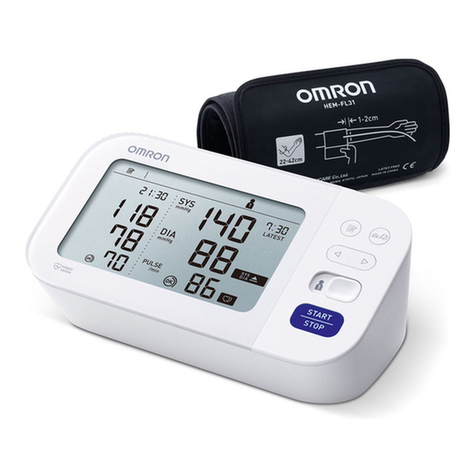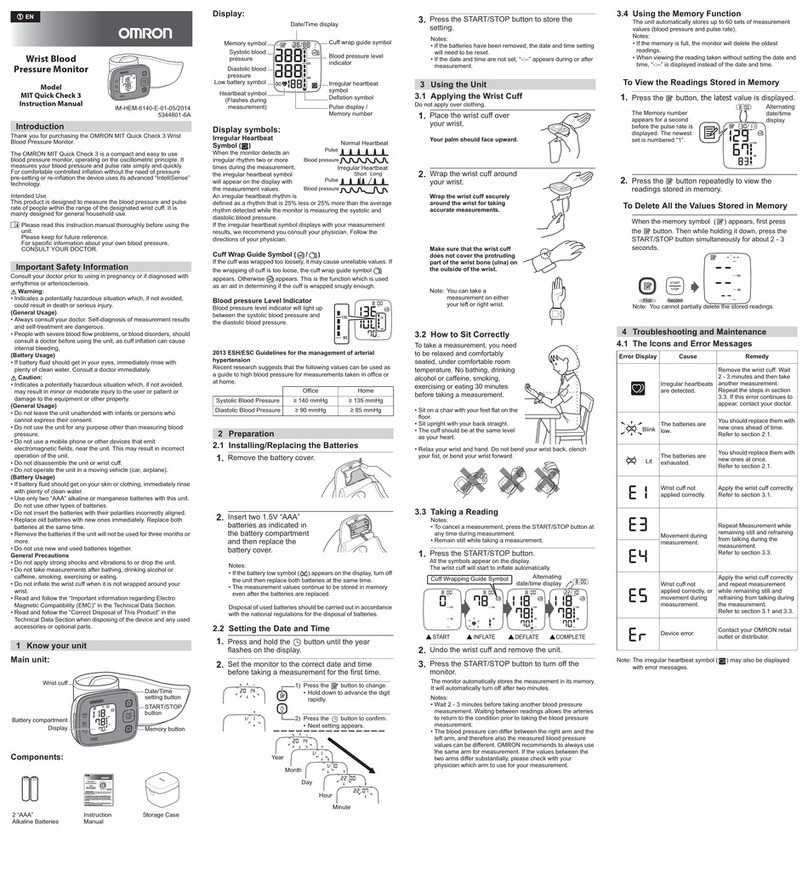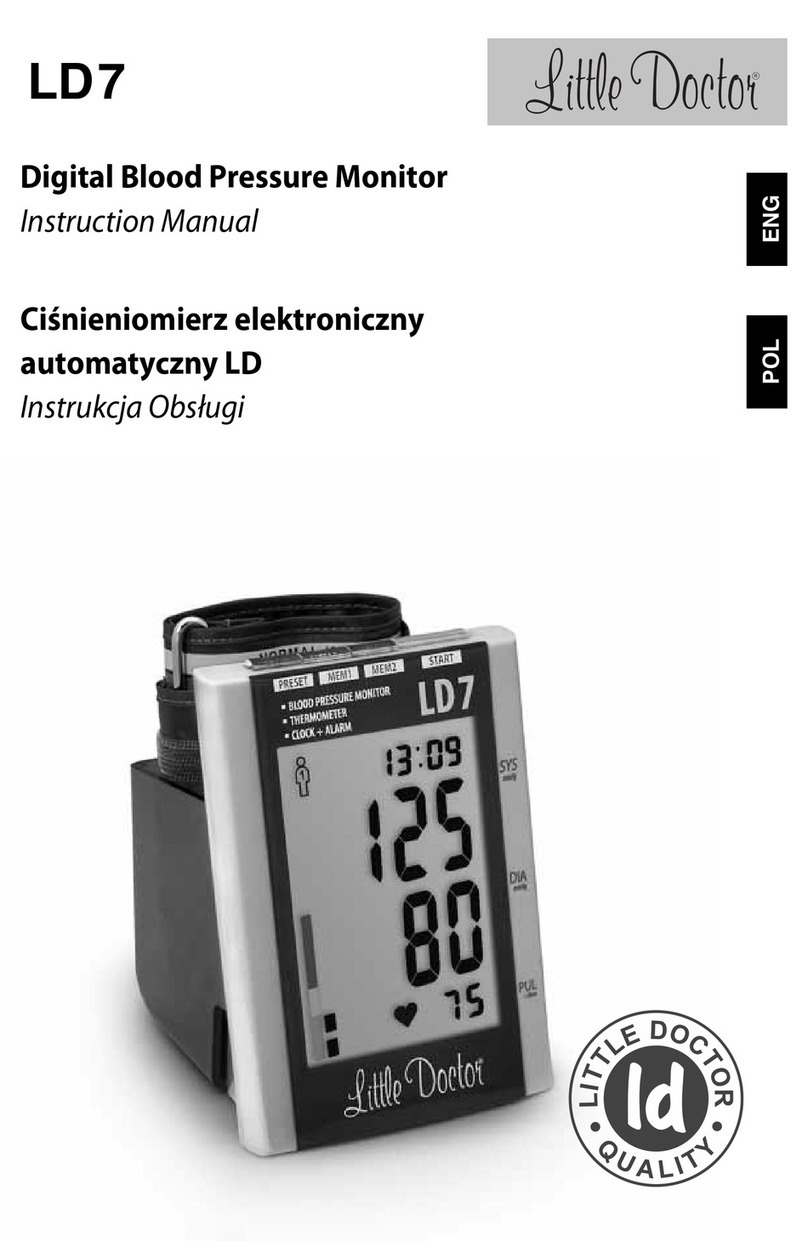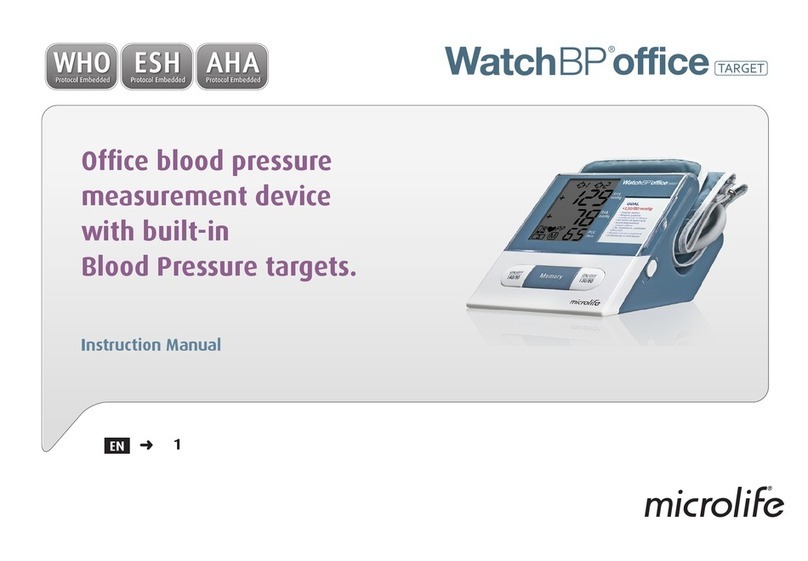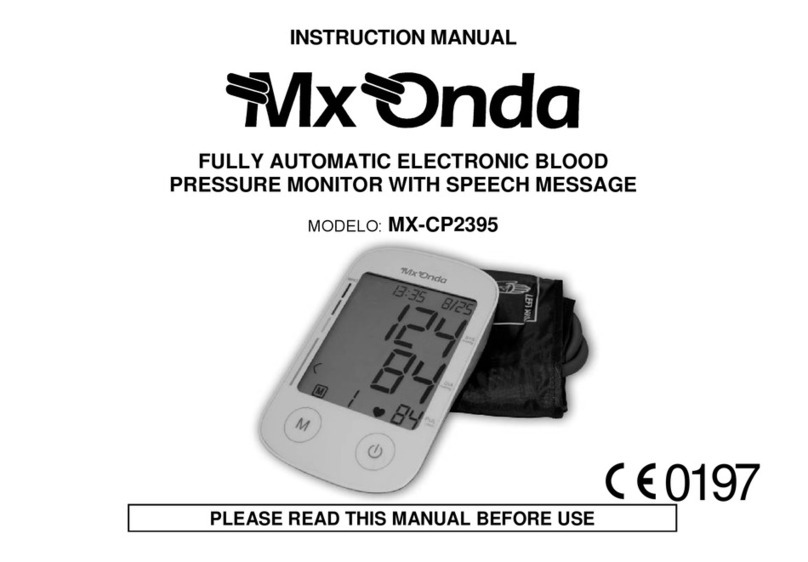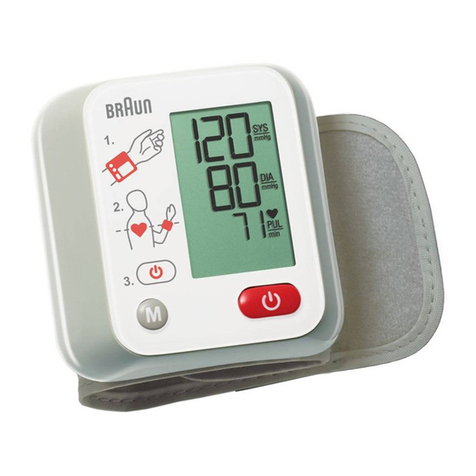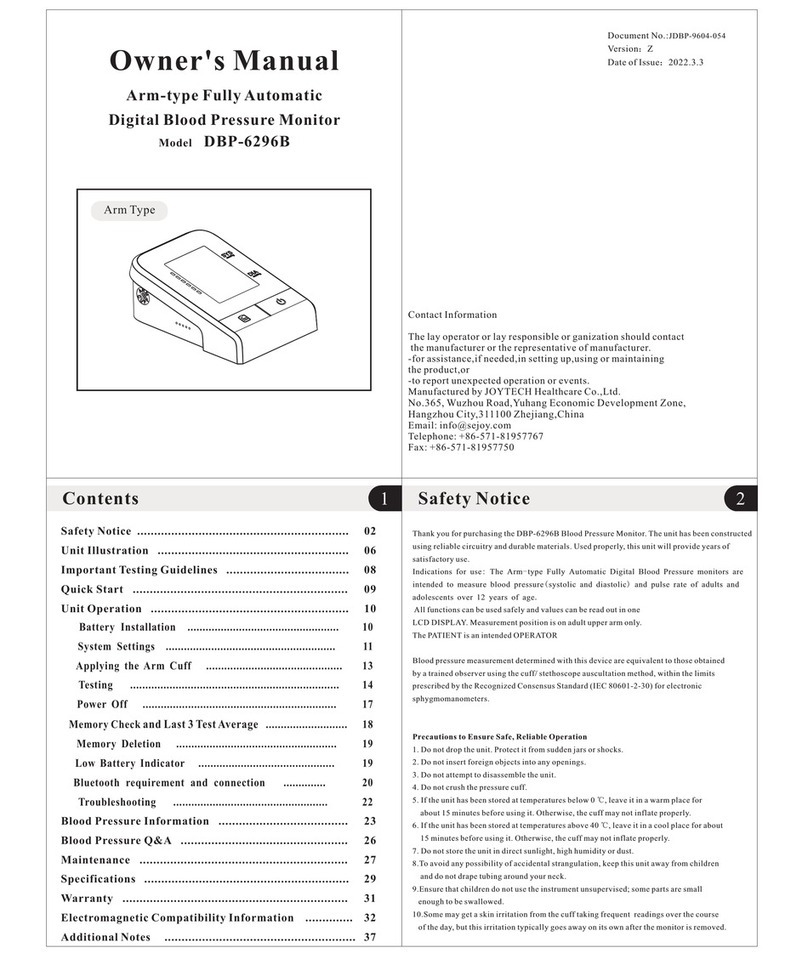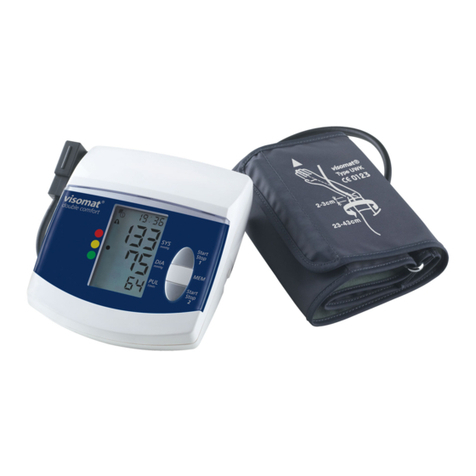2.1 Installing/Replacing the Batteries
Instruction Manual
Introduction
Important Safety Information
1. Overview
2. Preparation
3. Using the Unit
4. Handling Errors and Problems
Automatic Wrist
Blood Pressure Monitor
Model HEM-6111
Consult your doctor during pregnancy, arrhythmia and arteriosclerosis.
You should never change the dosage of medication prescribed by your doctor.
Use the HEM-6111 only for yourself.
Caution:
• Do not leave the unit unattended with infants or persons who cannot express
their consent.
• People with severe blood flow problems, or blood disorders, should consult
a doctor before using the unit. Cuff inflation may cause internal bleeding.
• Do not use the unit for any purpose other than measuring blood pressure.
• Do not use a cellular phone near the unit. This may result in incorrect
operation of the unit.
• Do not operate the unit in a moving vehicle (car, airplane).
• Do not apply strong shocks and vibrations to or drop the unit.
• Please observe the following points.
- Do not insert the batteries with their polarities incorrectly aligned.
- Replace old batteries with new ones immediately.
- When you are not going to use the unit for a long period of time
(approximately three months or more), take out the batteries.
- Do not use new and used batteries together.
- Do not use batteries of a different type together.
- Only use two “AAA” alkaline batteries with this unit. Do not use other types of
batteries.
- When using batteries, the battery liquid may leak and damage the main unit.
• Do not inflate the wrist cuff when it is not wrapped around your wrist.
You can take a measurement on either your left or right wrist.
Measurements can also be made on
the right wrist.
Fit the unit on the right wrist as shown.
Notes:
• If the fastener is not wrapped securely
around your wrist, the cuff may slip
during measurement.
• If you have a slender wrist, the cuff may
feel slightly loose.
However, this will not affect measurement
results and you should not force the cuff to fit.
• The remaining part of the wrist cuff can be
conveniently folded back out of the way.
•If the remaining part of the cuff is difficult
to fold back, measurement results will not
be effected.
Note: Tocancel a measurement, pressthe START/STOPbutton to turn off
the unit andto release the airin the wrist cuff.
Product Description
Model
Display
Measurement Method
Measurement Range
Memory
Accuracy
Inflation
Deflation
Power Source
Battery life
Applied Part
Protection Against
Electric Shock
Operating
temperature/ Humidity
Storage temperature/
Humidity/ Air Pressure
Console Weight
Outer Dimensions
Measurable
circumference of wrist
Package Content
Notes:
•Subject to technical modification without prior notice.
•
Disposal of thisproduct and used batteries should be carried outin accordance
with the national regulations for the disposal of electronic products.
Automatic Wrist Blood Pressure Monitor
HEM-6111
LCDDigital Display
Oscillometric method
Pressure: 0 mmHg to 299 mmHg
Pulse: 40 to 180 beats/min.
Memory 30 Measurements
Accuracy Pressure: ±3 mmHg
Pulse: ±5% of display reading
Automatic by electric pump
Automatic pressure release valve
2 “AAA” batteries 1.5V
Capacity of newalkaline batteries is approximately
300 measurements
= Type B
Internally powered ME equipment
10°C to 40°C/ 30 to 85% RH
-20°C to 60°C/ 10 to 95% RH/ 700-1060 hPa
Approximately 117 g without batteries
Approximately
71 (w) mm × 41 (h)mm × 70 (l)mm
Approximately 13.5 to 21.5 cm
Main unit, Storage case, Instruction manual, Battery
set
Taking a reading on the right wrist
Thank you for purchasing the OMRON HEM-6111 Automatic Wrist Blood
Pressure Monitor.
The OMRON HEM-6111 is compact and easy-to-use at home, at work, and
during travel. Perfect for people who frequently monitor their own blood pressure.
The unit also stores up to 30 measurement results in the memory.
Please read this instruction manual thoroughly before using the unit. For specific
information about your own blood pressure, CONSULT YOUR DOCTOR.
1. Place the wrist cuff over your left wrist with your left thumb
facing upward.
2. Hold the bottom part of the wrist
cuff and wrap it around the wrist
while pulling so that it fits
comfortably.
Smooth the cuff with your fingers
to ensure that it fits
snugly around the wrist.
1. Press the START/STOP button to start measurement.
The wrist cuff will start to inflate automatically after the
power is turned on.
2. After the unit has detected your blood pressure and
pulse rate, the cuff automatically deflates and your blood
pressure and pulse rate are displayed.
3.
Checkthe measurement results.
The unit automatically stores blood
pressure and pulse rate into its memory.
Refer to “3.4 Using the Memory
Function”.
Important:
Important:
•If your systolic or diastolic pressure is outside
the standard range, theheartbeat symbol will
blinkwhen the measurement result is displayed.
Recent research suggests that the following
values can be used as a guide to high blood
pressure for measurements taken at home.
This criteria is for home blood pressure measurement.
Notes:
•Self-diagnosis ofmeasured resultsand treatmentare dangerous.
Please followthe instructions of your doctor.
•Wait 2-3minutesbefore taking anotherblood pressure reading.
Waiting betweenreadings allows the arteries to return to the condition prior
to takingthe blood pressure measurement.
4. Undo the fastener and remove the unit.
5. Press the START/STOP button to turn the unit off.
Note: If you forget to turn the unit off, it will automatically shut itself off
after two minutes.
Note: When 30 sets of readings are stored in memory, the oldest set will be
deleted to store a new set.
Note: If there are no measurements results
stored in memory, the screen to the right
is displayed.
1.
Remove the battery compartment cover
by pulling it off in the direction of
the arrow.
1) Grasp both ends of the battery cover.
2) Pull the cover off the main unit.
2. Install or replace two“AAA” size
batteries so that the + (positive)
and - (negative)polarities match
the polarities indicated on the battery
compartment.
3. Put the battery cover backin place.
Note: The measurement values continue to be stored in memory even
after the batteries are replaced.
Diastolic blood
pressure
Systolic blood
pressure
Pulse display
Systolic Blood PressureAbove 135 mmHg
Diastolic Blood PressureAbove 85 mmHg
Main unit:
A.Display
B. Battery compartment
C. Wrist cuff
D.START/STOP button
E. MEM (Memory) button
2.2 Battery Life & Replacement
3.1 Applying the Wrist Cuff
This unit has a memory capable of storing 30 sets of readings. Every
time you complete the measurement, the unit automatically stores the
blood pressure and pulse rate.
If your systolic or diastolic pressure is outside
the standard range, the heartbeat symbol will
blink when the measurement result is displayed.
Refer to “3.3 Taking a Reading”.
1.
2.
Press the MEM button repeatedly
to cycle through the previous
measurement results.
The Memory
number appears for a second before
the pulse rate is displayed.
The newest set is numbered “1”.
3. Press the START/STOP button to turn the unit off.
If you forget to turn the unit off, it will automatically shut
itself off after twominutes.
1. To delete stored readings, first press the MEM button.
Then while holding it down, press the START/STOP
button simultaneously for about 2-3 seconds. All readings
will then be deleted.
2. Press the START/STOP button to turn the unit off.
If you forget to turn the unit off, it will automatically shut
itself off after two minutes.
3.3 Taking a Reading
- When the battery lowsymbol ( ) starts to blink, you will still be able to use
the unit for a short while. You should replace the batteries with newones
ahead of time.
- When the symbol ( ) remains lit, the batteries are exhausted. You should
replace the batteries with newones at once. Turn the unit off before replacing
the batteries.
Two new “AAA” alkaline batteries will last for approximately 300 measurements,
when used to take two measurements a day.
Since the supplied batteries are for monitoring use only, theymayhave
a shorter life and notlast for 300 measurements.
•Remove the batteries if the unit will notbe used for three months or more.
•Dispose of batteries according to applicable local regulations.
If the battery lowsymbol ( ) appears on the display,
replace both batteries at the same time.
6. Technical Data
HEM-6111-C1_C_M02_100309.pdf
Correct posture during measurement helps you get accurate results.
You should also try to measure your blood pressure at the same time each day.
3.2 Correct Posture
Sit comfortably with your
back straight, hold your arm
across your chest and relax.
To Delete All the Values Stored in Memory
You cannot delete individual stored readings, all the
readings in the unit will be deleted.
Relax your wrist and hand.
4.1 Error Messages
Error Display
Cuff over inflated. Repeat measurement.
Remain still and do not move
during measurement.
(Refer to “3.3 Taking a
Reading”.)
Movement during
measurement.
The wrist cuff
is not fastened
securely.
Carefully read and repeat
the steps listed under
“3.1 Applying the Wrist Cuff”.
An Er mark with
a code/number
indicates the
device has a
hardware failure.
Consult your OMRON retail
outlet or distributor.
The battery
power is low.
Replace the batteries with two
new “AAA” alkaline (LR03)
batteries.
Blinks or appears
continuously
Wrist cuff pressure
does not rise.
Air is leaking from
the wrist cuff.
Consult your OMRON
retail outlet or distributor.
The wrist cuff is loose.
Apply the cuff correctly
so that it is securely
wrapped around the wrist.
(Refer to “3.1 Applying
the Wrist Cuff”.)
The blood pressure is different each time.
The reading is extremely low (or high).
Blood pressure readings
constantly vary with
time of measurement
and nervous condition.
Take deep breaths to
relax before taking a
measurement.
The unit loses power
during measurement.
The batteries are
empty.
Replace the batteries
with new ones.
Nothing happens
when you press
the buttons.
The batteries are
empty.
Replace the batteries
with new ones.
The batteries have
been inserted
incorrectly.
Insert the batteries
with the correct (+/-)
polarity.
4.2 Troubleshooting
Problem Cause Remedy
The reading is
extremely low (or
high).
Are you holding
the wrist cuff at
heart level?
Measure while in
the correct posture.
(Refer to “3.2 Correct
Posture”.)
Is the cuff
wrapped snugly
around the wrist?
Wrap the cuff correctly.
(Refer to “3.1 Applying
the Wrist Cuff”.)
Are your arms and
shoulders tense?
Relax and try taking
the measurement again.
(Refer to “3.3 Taking
a Reading”.)
Other problems.
• Press the START/STOP button and repeat
measurement.
• If the problem continues, try replacing
the batteries with new ones.
If this still does not solve the problem,
contact your OMRON retail outlet or distributor.
Package contents:
Display:
H. Systolic blood pressure
I. Diastolic blood pressure
J. Memory symbol
(Displayed when viewing
values stored in memory)
K. Battery low symbol
L. Heartbeat symbol
1. Flashes during measurement
2. If flashing after measurement
complete indicates blood pressure
out of recommended range
M. Pulse display
N. Deflation symbol
Note: If your systolic or diastolic
pressure is outside the
standard range
(above 135/85 mmHg),
the Heartbeat symbol ( )
will blink. Refer to
“3.3 Taking a Reading”.
F. Two “AAA” alkaline (LR03)
batteries
G. Storage case
•Instruction manual
•Blood pressure monitor unit
F
G
3.4 Using the Memory Function
1667074-4D
• Do not carry out repairs of any kind by yourself.
If a defect occurs, consult your OMRON distributor.
Calibration and Service
• The accuracy of this blood pressure monitor has been
carefully tested and is designed for a long service life.
• It is generally recommended to have the unit inspected
every two years to ensure correct functioning and
accuracy. Please consult your authorised OMRON
dealer.
• Do not carry out any repairs yourself. If a defect occurs
or you have doubts about the correct functioning of the
device, consult your authorised OMRON dealer.
Storage
Do not store the unit in the following situations:
• If the unit is wet.
• Locations exposed to extreme temperatures, humidity,
direct sunlight, dust or corrosive vapours.
• Locations exposed to vibrations, shocks or where it will
be at an angle.
• Locations exposed to chemicals or corrosive vapours.
5. Maintenance and Storage
Maintenance
To protect your unit from damage, please observe the following:
• Do not subject the main unit and cuff to extreme
temperatures, humidity, moisture or direct sunlight.
• Do not inflate the wrist cuff over 299 mmHg.
• Do not disassemble the unit.
• Do not subject the unit to strong shocks or vibrations
(for example, dropping the unit on the floor).
• Do not use volatile liquids to clean the main unit.
The unit should be cleaned with a soft, dry cloth.
• Do not use petrol, thinners or similar solvents to clean
the wrist cuff.
Movement or
talking during
measurement.
Remain still and do not
talkduring measurement.
(Refer to “3.3 Taking
a Reading”.)
Wrist cuff deflates
too soon.
Cause Remedy
Notes:
• Do not take measurement after bathing, drinking alcohol, or exercising.
• Do not move or talk during measurement.
Notes:
• To ensure correct measurement, apply the wrist cuff so that it fits comfortably
around your wrist.
• Roll up your sleeve so that the unit covers bare skin.
• Do not apply over clothing.
Note: Make sure that the wrist cuff does not cover the protruding part of
the wrist bone (ulna) on the outside of the wrist.
Note: Unless the wrist cuff is wrapped securely around the wrist, it may
not be possible to take correct measurements.
Press the MEM button to view readings stored in
memory from the most recent to the oldest.
The Memory number appears for a second before the
pulse rate is displayed.
The newest set is numbered “1”.
Please read this instruction manual carefully before using the device.
• Thisdevice fulfils the provisions of EC directive 93/42/EEC (Medical Device
Directive).
• This blood pressure monitor is designed according to the European Standard
EN1060, Non-invasive sphygmomanometers Part 1: General Requirements
and Part 3: Supplementary requirements for electromechanical blood
pressure measuring systems.
Important information regarding Electro Magnetic Compatibility (EMC)
With the increased number of electronic devices such as PC’s and mobile
(cellular)telephones, medical devices in use may be susceptible to
electromagnetic interference from other devices.
Electromagnetic interference may result in incorrect operation of the medical
device and create a potentially unsafe situation.
Medical devices should also notinterfere with other devices.
In order to regulate the requirements for EMC (Electro Magnetic Compatibility)
with the aim to preventunsafe product situations, the EN60601-1-2:2007
standard has been implemented. This standard defines the levels of immunity to
electromagnetic interferences as well as maximum levels of electromagnetic
emissions for medical devices.
This medical device manufactured by OMRON HEALTHCARE conforms to this
EN60601-1-2:2007 standard for both immunity and emissions.
Nevertheless, special precautions need to be observed:
• Donot use mobile (cellular)telephones and other devices, which generate
strong electrical or electromagnetic fields, near the medical device. This may
result in incorrect operation of the unit and create a potentially unsafe situation.
Recommendation is to keep a minimum distance of 7 m. Verify correct
operation of the device in case the distance is shorter.
Further documentation in accordance with EN60601-1-2:2007 is available at OMRON
HEALTHCARE EUROPE at the address mentioned in this instruction manual.
Documentation is also available at www.omron-healthcare.com.
This marking shownon the product or its literature, indicates that it
should notbedisposed of, with other household wastes at the end
of its working life. To prevent possible harm to the environment or
human health from uncontrolled waste disposal,please separate
this from other types of wastes and recycle it responsibly to
promote the sustainable reuse of material resources.
Household users should contact either the retailer where theypurchased this
product, or their local government office, for details of where and howthey can
take this item for environmentally safe recycling.
Business users should contact their supplier and checkthe terms and conditions
of the purchase contract. This product should notbemixed with other commercial
wastes for disposal.
This product does not contain any hazardous substances.
Correct Disposal of This Product
(Waste Electrical & Electronic Equipment)
1
2
Do not use your other
hand to support the wrist cuff.
This can result in inaccurate
measurement results.
2
1
Donotbend
your wrist back.
Do not clench
your fist.
Do not bend
your wrist forward.
Position your arm so that
the unit is at the same
level as your heart
(height of a nipple).
ulna
H
L
N
I
M
K
A
E
B
D
C
J
Asia Pacific HQ
OMRON HEALTHCARE Co., Ltd.
53, Kunotsubo, Terado-cho, Muko, Kyoto
617-0002 Japan
OMRON HEALTHCARE EUROPE B.V.
Scorpius 33, 2132 LR Hoofddorp, THE NETHERLANDS
OMRON HEALTHCARE SINGAPORE PTE LTD.
438A Alexandra Road, #05-05/08, Alexandra Technopark,
Singapore 119967
